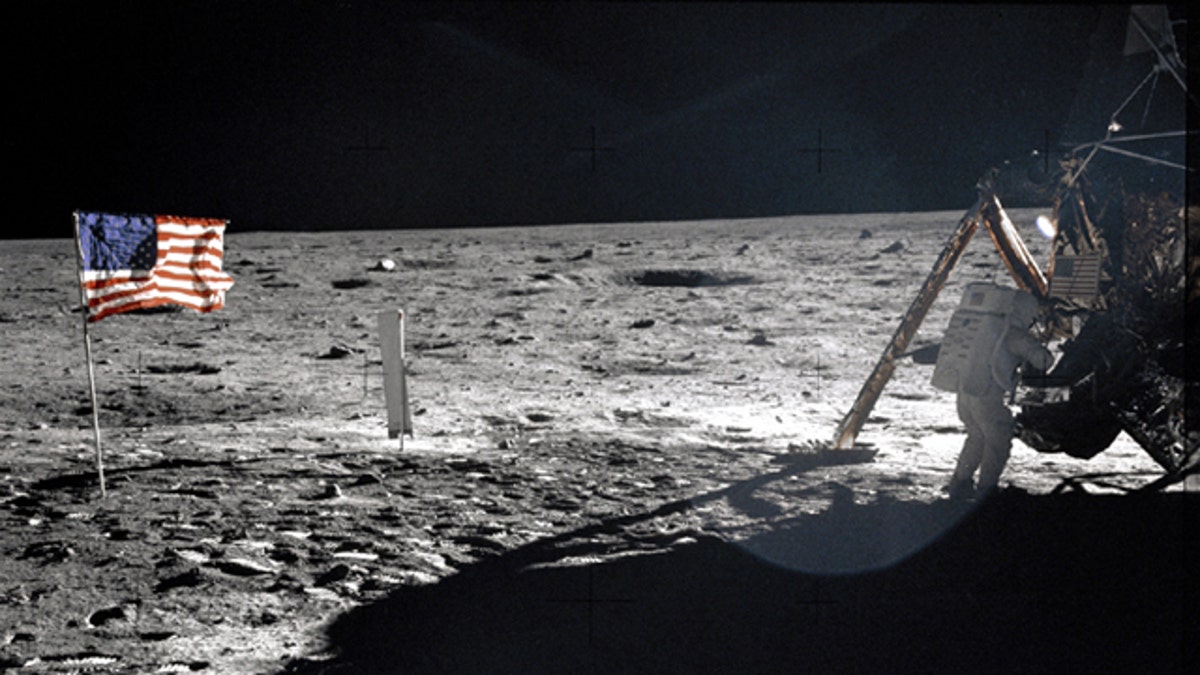
July 20, 1969: Astronaut Neil A. Armstrong, Apollo ll mission commander, during the historic first walk on the lunar surface. (NASA)
CAPE CANAVERAL, Fla. – First moonwalker Neil Armstrong, first American in orbit John Glenn, Mission Control founder Chris Kraft, Apollo 13 commander Jim Lovell, first shuttle pilot Robert Crippen and others are pushing for a last minute reprieve for the about-to-be-retired space shuttle fleet. They're even urging a delay of Friday's final launch.
They may get a delay of a day or two because of bad weather. But the NASA veterans are looking for a pause of more than a year, until more shuttle parts are ready to keep flying and extend the 30-year program.
Back in June, as Atlantis headed to the launch pad, launch director Mike Leinbach on a live audio loop groused to his fellow workers "we're all victims of poor policy out of Washington, D.C.," for not having a new mission for the post-shuttle era.
Glenn, who returned to space at the age of 77 by flying on the shuttle Discovery in 1998, said: "I told the president, 'We're violating one of NASA's critical design criteria."'
That means there must be a backup system for getting into space and bringing astronauts home from the International Space Station.
Armstrong, Kraft and Lovell sent a letter June 30 to President Barack Obama and NASA chief Charles Bolden asking that they keep shuttles flying and delay this final launch. Glenn, who wasn't involved in the letter campaign, is also calling it a mistake to end the space shuttle program -- planned since 2004.
Kraft said he considered a backup crucial as he ran Mission Control or oversaw the people who did -- missions from the Mercury days of the 1960s through early space shuttle days. He said it is still possible at this late date to put Atlantis' final mission on hold while NASA builds new external fuel tanks and boosters for future shuttle flights -- a process that would delay the launch about 18 months.
"It's a generational thing. It's a culture thing and mostly it's a political thing," said Kraft, 87. Nearly all the signees of the letter are in their 70s and 80s. Glenn, who didn't sign the letter, will turn 90 this month.
It's a fight Kraft has waged for at least three years, pulling in Armstrong, 80, and others. Armstrong, in an email to The Associated Press, wrote: "Chris is an exceptional engineer and manager who has always been reliable in the many cases where he held the success or failure of American human space flight in his hands." He wrote that if Kraft thinks this is too risky a plan, "I can readily accept that."
For his part, NASA Administrator Bolden, a former shuttle commander, defended the shuttle retirentury approach: "This is a century with new challenges and also new opportunities."
Scott Parazynski, a 49-year-old former astronaut who heads the educational center created by Challenger families, said in an email that he agrees with Kraft that NASA shouldn't be left without a backup to the Soyuz, but disagrees with the idea of delaying the shuttle retirement.
"The cards have been dealt, and even though we may not all like the cards we've gotten, we've got to play," Parazynski wrote. "I see a path forward that gives American industry (new enterprise as well as established aerospace) and NASA a bright future."
The American public apparently wants the U.S. to continue to be a space leader. According to a poll by the Pew Research Center released Tuesday, 58 percent of Americans think it's essential the nation continue as a leader in space.
For his part, Glenn said he doesn't disagree with Obama's plans, although he said he believes private spaceflight will take years longer than Bolden predicts. What Glenn objects to is the gap between the shuttle and a future spacecraft. While the Soyuz is reliable, Glenn said NASA should always want an alternative in case of a "hiccup" in the Soyuz plans.
"I think we should be keeping the shuttle going," Glenn said. "It's the most complicated vehicle ever put together by people."
